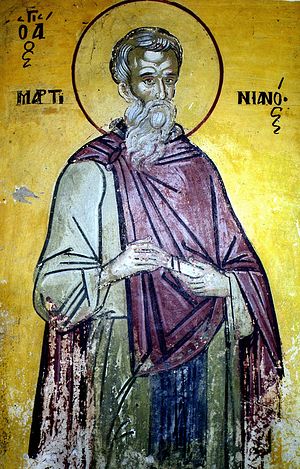Saint Martinian went to live in the wilderness at the age of eighteen, not far from the city of Caesarea in Palestine. For twenty-five years, he devoted himself to ascetic deeds and silence, and he was granted the gift of healing illnesses and casting out demons. However, the Enemy of the race of man would not stop bothering the hermit with various temptations.
Once a profligate woman made a wager with some dissolute people that she could seduce Saint Martinian, the fame of whose virtuous life had spread throughout all the city. She came to him one night pretending that she had lost her way in the storm, and asking for shelter. The saint let her enter, unable to turn her away in such a storm. He went into his room and locked the door. The wicked guest changed into beautiful clothes and began to tempt the ascetic.
When morning came, Saint Martinian came out to send the woman away. Though he was tempted by the woman’s beauty, he was determined not to fall into sin. Lighting a fire, he stepped into it, saying, “You want me to burn with temptation, and want to lead me into the fires of Hell. I will not let you. Instead, I will burn for my virginity and save my soul.”
The woman came to see how evil she was. She repented and asked the saint to guide her onto the way of salvation. He told her to go to Bethlehem, to Saint Paula (January 26). There she lived as a nun for twelve years in strict asceticism until her blessed end. The woman’s name was Zoe.
Saint Martinian went to an uninhabited rocky island, and lived on it under the open sky for several years, nourished by the provisions brought by a certain sailor from time to time. In return the monk wove baskets for him.
Once a powerful storm wrecked a ship, and a woman named Photina floated on pieces of the wreckage to the island of Saint Martinian. Saint Martinian helped her to survive the island. “Remain here,” he told her, “for here is bread and water, and in two months a boat will come.”
Then he jumped into the sea and swam off. Two dolphins carried him to dry land. Thereafter, Saint Martinian led the life of a wanderer. Later, he came to Athens and fell ill. Sensing the approach of death, he went into church and lay upon the floor. God revealed to the Bishop of Athens who Saint Martinian was, and the bishop buried his body with honor. This occurred around the year 422.
Troparion — Tone 8
You quenched the flames of passion, blessed Martinian, with abundant tears; / you calmed the waves of the sea and checked the assaults of wild beasts, saying: / “Almighty God, You are most glorious, for You have saved me from the fire and storm!”
Kontakion — Tone 2
Let us worthily praise with hymns the ever-venerable Martinian, / the tried ascetic who struggled for piety, / an honorable athlete by deliberate choice, / and a resolute citizen and inhabitant of the desert; / for he has trampled down the serpent.

